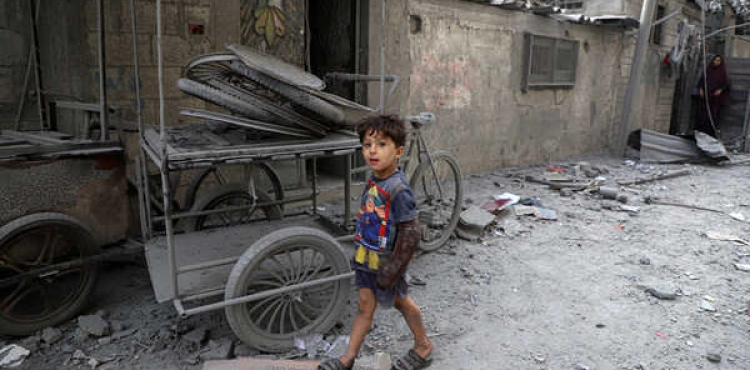Only 2% of the food needed has been brought into Gaza since the blockade was imposed
Oxfam said that Israel is using the starvation policy as a weapon of war against civilians in Gaza, and renewed its call to allow food, water, fuel and other necessities to enter the Gaza Strip, which has been subjected to continuous aggression since the seventh of this October.
Oxfam confirmed, based on an analysis of United Nations data, that only 2% of the food supplies that were arriving in the Gaza Strip had been entered since the imposition of the comprehensive blockade on October 9, and that no commercial food commodities had entered despite a small amount of food aid being allowed to enter. .
She pointed out that although 62 trucks loaded with aid were allowed to enter southern Gaza through the Rafah crossing over the weekend, only 30 trucks contained food supplies, and not necessarily exclusively in all cases.
Before the aggression, 104 trucks were delivering food supplies to the besieged Gaza Strip daily, at a rate of one truck every 14 minutes, while we are now talking about the entry of only one truck every three hours and 12 minutes since last Saturday.
Oxfam's Regional Director for the Middle East and North Africa, Sally Abi Khalil, said: The situation is absolutely horrific! Where is humanity? Millions of civilians in Gaza are being subjected to collective punishment in full view of the world. There can be no justification for using starvation as a weapon of war. "World leaders cannot continue to sit and watch. They must act, and act now."
She added: "With every day the situation is getting worse. Children are suffering from severe trauma due to the constant bombing, and their drinking water is contaminated or rationed, and soon families may not be able to feed their children either. How much are the residents of Gaza expected to bear?"
Oxfam said, “It has become painfully clear that the humanitarian situation unfolding in Gaza matches exactly what the United Nations Security Council Resolution 2417 unanimously condemned in 2018 prohibiting the use of starvation as a tool of war against civilians, declaring that any prevention of humanitarian access is a violation of the law.” International.
Not only food, clean water has run out, as estimates indicate that there are now only three liters of clean water available per person, while the United Nations confirms that at least 15 liters per day is necessary as a minimum per person in high-intensity humanitarian emergencies. .
A spokesman for the United Nations Agency for Palestinian Refugees (UNRWA) indicated that some of the food aid allowed to enter, such as rice and lentils, is useless because people do not have clean water or fuel to prepare it.
Oxfam explained that the air strikes led to the destruction or damage of many bakeries and supermarkets in the Strip. Those that are still operating cannot meet the demand for fresh bread and are also at risk of closure due to a lack of necessities such as flour and fuel. Today, the only working wheat mill in Gaza has become useless due to a power outage.
The power outage also disrupted food supplies by affecting the ability to cool, irrigate crops, and operate crop incubators. More than 15,000 farmers have lost their crop production, 10,000 livestock farmers cannot obtain sufficient fodder, and many have lost their animals.
Oxfam said the blockade, along with air strikes, had paralyzed the fishing sector, with hundreds of people who depend on fishing losing access to the sea.
Oxfam urged the United Nations Security Council and United Nations member states to take immediate action to prevent the situation from deteriorating further, and called for an immediate ceasefire, and to provide fair and unrestricted access to humanitarian aid in the entire Gaza Strip, in addition to all necessary supplies of food and water. Medical supplies and fuel to meet the needs of the population.
International humanitarian law strictly prohibits the use of starvation as a tool of war, and as the occupying power in Gaza, Israel is obligated under international humanitarian law to provide for the needs and protection of the people of Gaza.












